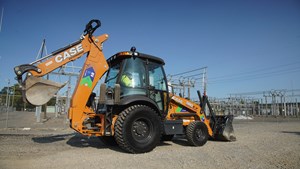CASE Delivers Electric Backhoe Loaders to Utilities in New York
The construction industry’s first designed and commercially developed electric backhoe loaders — two CASE 580 EV backhoes from CASE Construction Equipment — have been delivered and are currently working with utilities in New York.
New York State Gas & Electric (NYSEG) and Rochester Gas & Electric (RG&E), AVANGRID, Inc. subsidiaries will debut its first electric backhoe this week at a special event in New York, and National Grid took delivery of its first electric backhoe earlier this year. The backhoes require no diesel and produce zero emissions — all while providing the power and performance associated with diesel-powered equipment.
CASE announced the development of the electric backhoe in March of 2020, and has been working with each utility on refining the machines ahead of final delivery and field deployment. Electrification of the CASE 580 EV was performed in conjunction with New York companies Green Machine Equipment, Inc. and Moog Inc. Monroe Tractor in New York will work with each utility and the integration partners to support the equipment in the field.
NYSEG and RG&E President and CEO Carl Taylor believes that the deployment of electric construction equipment into the communities they serve is driven by sustainability and the desire to be responsible neighbors.
“At NYSEG and RG&E, the driving force behind all of our decisions is to put our customers first and care for the communities we serve,” says Taylor. “As an energy provider, we have a responsibility to be good stewards of the environment and build a more sustainable future for our communities. The addition of this first-of-its-kind backhoe into our fleet will help us meet sustainability goals and benefit the communities we serve by providing a cleaner work environment in the form of emissions and noise reduction. It’s equipment like this that will drive our fleets, businesses and communities into the future.”
The 580 EV is powered by Green Machine’s proprietary 480-volt, 90-kilowatt-hour lithium-ion WhisperDrive battery pack that can be charged by any 220-volt connection. While applications vary, each charge can support common eight-hour workdays. The battery separately powers the drivetrain and hydraulic motors, resulting in hydraulic breakout forces equal to diesel-powered machines and improved performance during simultaneous loader and drivetrain operation.
It is estimated that the 580 EV could save fleets as much as 90 percent in annual vehicle service and maintenance costs when taking into account the reduction/elimination of diesel, engine oil, diesel exhaust fluid, regular preventive maintenance and long-term engine upkeep/maintenance (and the associated labor rates and time savings).
“National Grid and NYSEG and RG&E are at the forefront of living the clean energy promise in their communities, and their use of electrically powered equipment like the CASE 580 EV shows that fleets can be clean while also delivering where it counts in the field,” says Leandro Lecheta, head of construction — North America, CASE Construction Equipment. “We share that commitment to develop and stand behind equipment that meets sustainability and productivity goals, while also being good for the communities we work in together.”
Related News
From Archive

- Glenfarne Alaska LNG targets late-2026 construction start for 807-mile pipeline project
- U.S. water reuse boom to fuel $47 billion in infrastructure spending through 2035
- $2.3 billion approved to construct 236-mile Texas-to-Gulf gas pipeline
- Major water pipe break in Puerto Rico hits over 165,000 customers
- Potomac River Tunnel project enters construction phase beneath Washington, D.C.
- Pennsylvania American Water launches interactive map to identify, replace lead water service lines
- Trump's tariffs drive $33 million cost increase for Cincinnati sewer project
- Utah city launches historic $70 million tunnel project using box jacking under active rail line
- Tulsa residents warned after sewer lines damaged by boring work
- Fatal trench collapse halts sewer construction in Massachusetts; two workers hospitalized




Comments